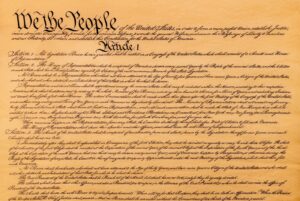In late March, during oral arguments before the Supreme Court on Proposition 8 and the Defense of Marriage Act, the Human Rights Campaign urged supporters of same-sex marriage to “paint the town red” with their wardrobe choices and by changing their profile pictures to a red “=” sign. By most accounts, the campaign succeeded, with Facebook’s data indicating that on Tuesday, March 26, the first morning of arguments, 2.7 million more people than usual changed their profile.
One story featured a screenshot of Twitter comments debating the campaign’s efficacy, one of which read (at 3:20 in the video), “‘KONY’ and ‘EQUALS SIGNS’ the two great marks of our generation. All done by a simple profile picture change. What else can we accomplish?!?”
Sometimes a tweet is just a tweet, but this one hints at power, truth, and ideology in a particularly interesting way. While it’s tempting to ignore the sentiment expressed as somewhat silly, the author, I do not doubt, viewed this not only as an expression of belief but as a real accomplishment—in his eyes the profession did something.
There are, of course, some statements the utterance of which brings about a state of affairs—“I now pronounce you husband and wife,” “I hereby declare these Olympic Games open,” “going once, twice … sold”—but those performances depend upon authority delegated to the minister, Games representative, or auctioneer. In those examples, some rule of recognition exists whereby the officeholder’s statement is acknowledged as enacting the utterance. What would that mean for the profile update?
Start your day with Public Discourse
Sign up and get our daily essays sent straight to your inbox.I suspect the Facebook “accomplishment” relates to rules of recognition as well, albeit in ways less formalized than for the status of officeholders. As Charles Taylor articulates, for contemporaries there exists a link between “recognition and identity,” whereby a person’s “understanding of who they are, of their fundamental defining characteristics as a human being” is “partly shaped by recognition or its absence.” This is particularly the case for misrecognition, for a person or group “can suffer real damage, real distortion, if the people or society around them mirror back to them a confining or demeaning or contemptible picture of themselves.” Since recognition by others shapes one’s identity, failure to be recognized “can inflict harm, can be a form of oppression, imprisoning someone in a false, distorted, and reduced mode of being.”
As Taylor explains, since self-interpretation is static and given in an aristocratic society but more fluid and dynamic in a democratic culture, we have become something of a problem to ourselves—we can create ourselves in ways once not possible.
Furthermore, the radical turn to subjectivity in modern thought also posits “a new form of inwardness . . . with inner depths,” including our own “original way of being human.” We are, each of us, an original, “called to live . . . in this way and not in imitation of anyone else’s life.” There are no models to imitate, we must be the unique self we are, and authenticity is living up to our own selfhood.
A strange tension exists between authenticity and recognition, however. On the one hand, if the standard of authenticity is our own internal sense of unique selfhood, social recognition should be irrelevant and unnecessary. On the other hand, says Taylor, our ability to define ourselves depends upon “dialogical relations with others,” particularly in finding language with which to express our identity.
So, (1) there is no standard of a life lived well other than our own authenticity, (2) our identity depends upon others recognizing us, granting our capacity to self-identify, and (3) given the fluidity of contemporary social recognition, our identities are quite fragile. Consequently, if not recognized, or misrecognized, we are harmed in a very real way, for the ability to thrive and be well as ourselves is rendered impossible.
If this is true, then the simple act of changing a profile picture is a twofold accomplishment of enormous significance. First, the person who updates his or her picture, which is a public act seen and recognized by others, by that act is established in his or her identity as fair and just. Second, the now-firmly-established-as-just person recognizes, and thereby renders possible, the authentic identity of those he or she recognizes. In this view, the worth and dignity of individuals (in this case those desiring same-sex marriage) is actually established by “=”, while those refusing to recognize cause harm.
While the context is markedly different, the power entailed in the profile’s interpretation resembles Václav Havel’s diagnosis of a greengrocer under Soviet rule who somewhat thoughtlessly posts Marxist slogans in his shop, not from deep conviction or enthusiasm, but because it allows him to “get along in life,” one of “the thousands of details” that allow us “a relatively tranquil life” in society. While the sign allows the grocer to fit in, it also “helps the greengrocer to conceal from himself the low foundations of his obedience, at the same time concealing the low foundations of power.” That is, it hides ideology, itself a guarantor of identity:
In an era when metaphysical and existential certainties are in a state of crisis, when people are being uprooted and alienated and are losing their sense of what this world means, this ideology inevitably has a certain hypnotic charm. To wandering humankind it offers an immediately available home: all one has to do is accept it, and suddenly everything becomes clear once more, life takes on new meaning, and all mysteries, unanswered questions, anxiety, and loneliness vanish. Of course, one pays dearly for this low-rent home: the price is abdication of one’s own reason, conscience, and responsibility.
Like Taylor, Havel indicates the loss of stable forms of life, meaning, and identity and the vertigo accompanying the shift, and how the desire for “home,” for a guarantor of fixed identity, almost magically prompts acceptance of the “immediately available” security.
If Taylor’s description is correct, as I think it is, the self-aggrandizing statements that KONY and “=”define the accomplishments of an entire generation are not innocently juvenile but reveal, like the greengrocer, an ideology seductive in its promise of permanent, ready-made identity at a time when “all metaphysical and existential certainties are in a state of crisis.” Posting the “=”is not solidarity, it is a means by which authenticity and identity are thought to be established.
It also poisons the wells of the rhetorical situation, with “reason, conscience, and responsibility” abdicated by many.
Here’s what I mean: If a person describes his or her identity and its authentic flourishing as entailing and requiring x—say, for example, state recognition of one’s romantic self-expression—then to experience another person or group suggesting that x is logically or naturally or metaphysically impossible is to be harmed. Never mind whether the second group has good reasons, for the reasons are irrelevant, swept aside by the ideological currents involved in the nexus of identity-authenticity-recognition.
In fact, even to make an argument against x is, for some, to be disqualified as a responsible, fair, and just interlocutor, meaning that to be an interlocutor in any critical or responsible way is deemed irresponsible; one is to be a mirror in which others’ claims of identity confirm a recognition of their own selfhood in a simulacrum of dialogue. Only recognition is permissible.
In many ways, the jargon of authenticity is an affront to political friendship, as it demands that the other always capitulate to your claims, for not doing so is tantamount to harm. And since authenticity cannot be determined by any standards external to yourself, even though you require others to support you, appeals to standards such as religion, metaphysics, tradition, even reason, must be viewed as threats and denials of democratic equality, and thus unacceptable.
This is the ideologically charged rhetorical situation in which we find ourselves. A situation in which the act of posting “=” is a blow for justice, but a nuanced, sophisticated, careful, and charitable public argument can be considered bigotry.
In tomorrow’s essay, I’ll propose a way to rehabilitate authenticity; it’s too valuable an ideal to allow its corruption.












